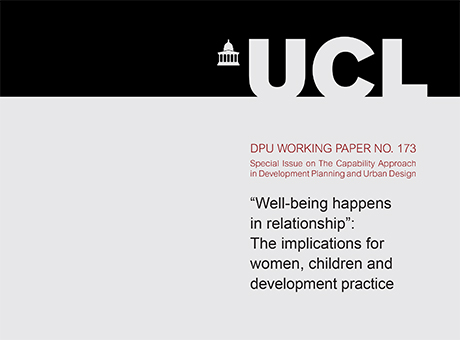DPU Working Paper - No. 173
Wellbeing happens in relationship: Implications for women, children and development practice

4 May 2015
Author: Sara Brayford
Publication Date: May 2015
ISSN: 1474-3280
The complexity of the dynamics of women’s and children’s relationships cannot be underestimated. However, the trends in development policy practice either fail to give an adequate account of women and children as individuals who can exercise agency in their own development, or view women as a development dream in which women simultaneously promote child welfare, earn income, and manage community assets.
This paper positions well-being of women and children within a capability approach framework, thus underscoring the significance of well-being on the personal level and highlighting the ways in which well-being is influenced by relationships with others. The paper draws out the variegated ways in which “well-being happens in relationship” (White, 2010). Relating with others is a central capability on its own, but membership in or affiliation to groups or kin can also generate more capabilities and freedoms through collective action, others’ external capabilities, and the support given through relationships of love and care. Nevertheless, the quality of relationships, including the power dynamics, trade-offs, and inherent social norms implicated in relationships, colours the extent to which relationships contribute to expanding one’s overall capability set. This paper integrates theory with a discussion of its practical implications, and broad recommendations are made for how a relational understanding of women and children’s well-being could be recognised in development policy and practice.
 Close
Close

